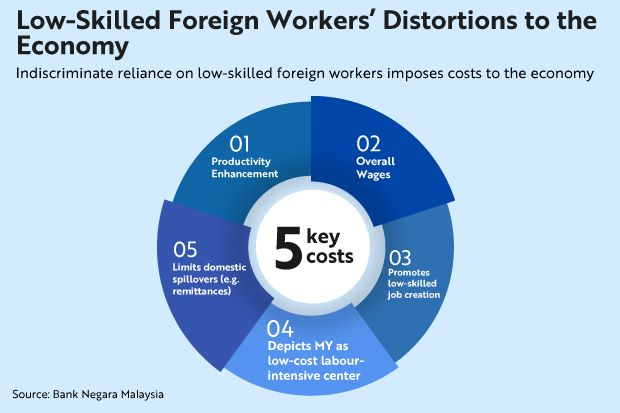Malaysia: It’s high time for high quality and good paying jobs
KUALA LUMPUR: The domestic economy and the income levels of Malaysians are being weighed down by the high numbers of low-wage foreign workers, according to Bank Negara.
Governor Tan Sri Muhammad Ibrahim said the country should cut back on its foreign worker dependency to drive higher wages for Malaysians across-the-board.
He also cautioned that Malaysia was at high risk of being labelled as a “low-cost, labour-intensive” investment centre among foreign investors, if the high reliance on foreign workers was not addressed.
“In Malaysia, our salaries and wages are low, as half of the working Malaysians earn less than RM1,700 per month and the average starting salary of a diploma graduate is only about RM350 above the minimum wage.
“The low-income segment of Malaysian households face many challenges with regard to their income level. Since 2014, the bottom 40% (B40) population’s income expanded by 5.8% on an annual basis. However, expenditure grew at a faster pace of 6%, reflecting the rising cost of living.
“It is high time to reform our labour market by creating high-quality, good-paying jobs for Malaysians,” he said at a media briefing after the release of the central bank’s 2017 annual report here yesterday.
Muhammad pointed out that prolonged dependence on low-income foreign workers had high macroeconomic costs on the domestic economy, although many individual firms have benefited from the influx of cheap labour.
“In the 1990s, low-skilled foreign workers were brought in as a temporary solution for the labour shortage domestically. Unfortunately, the stop-gap measure has become an entrenched feature of the Malaysian economy,” he added.
Extensive availability of low-wage and low-skilled foreign workers will impede Malaysia’s productivity improvement and also lead to the creation of more low-skilled employment opportunities.
From 2011 to 2017, the share of low-skilled jobs in Malaysia increased significantly to 16% compared with only 8% in the period of 2002 to 2010. Apart from that, local economic sectors that rely on foreign workers such as agriculture, construction and manufacturing also suffer from low productivity.
Meanwhile, Muhammad said it is timely to aspire to achieve a minimum acceptable living standard for all citizens, as Malaysia moves towards becoming a high-income nation.
Citing the “living wage” as a guide for a minimum acceptable standard of living, he said that it would enable meaningful participation in society, personal and family development, as well as freedom from severe financial stress.
“The provision of a living wage that commensurates with productivity can be a step towards higher and quality living standards in Malaysia.
“For example, in Kuala Lumpur, the central bank’s provisional estimate of a living wage in 2016 was RM2,700 for a single adult and RM6,500 for a couple with two children. However, about 27% of the households in Kuala Lumpur are earning below the living wage,” he said.
Source: https://www.thestar.com.my/business/business-news/2018/03/29/its-time-for-highquality-and-goodpaying-jobs/#a1p42Xkfm3Dlqc3X.99


 English
English




